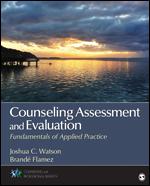 As part of ethical practice, counselors must integrate the process of assessment and evaluation into their work as an essential, guiding tool. Joshua C. Watson and Brandé Flamez weave this theme throughout their book, Counseling Assessment and Evaluation: Fundamentals of Applied Practice. The book offers the basic fundamentals of counseling assessment and evaluation while providing the steps to translate the base of knowledge into sound research and clinical practice.
As part of ethical practice, counselors must integrate the process of assessment and evaluation into their work as an essential, guiding tool. Joshua C. Watson and Brandé Flamez weave this theme throughout their book, Counseling Assessment and Evaluation: Fundamentals of Applied Practice. The book offers the basic fundamentals of counseling assessment and evaluation while providing the steps to translate the base of knowledge into sound research and clinical practice.
The book is organized into three sections. In the first section, the authors begin with the principles and foundations of counseling assessment, including an introduction; the basic statistical concepts; reliability; validity; selecting, administering, scoring and reporting assessment results; and how to integrate assessment into counseling practice. Within the chapters, the authors include brief sections for self-reflection or application, referred to as guided practice exercises, that facilitate a deeper understanding of the information and the application of assessment and evaluation into practice.
In section two, the authors provide an overview of the most common assessment areas. The authors selected six assessment areas to cover for readers: intelligence and general ability assessment; achievement and aptitude assessment; standardized methods of personality assessment; projective methods of personality assessment; behavioral assessment; and career and vocational assessment. These chapters are arranged with case illustrations to provide concrete examples and with tables and figures to display information and break up the text appropriately.
Lastly, the third section includes information about the application of and common issues with assessment and evaluation. This information was scattered throughout the previous sections; however, the four chapters in section three provide more detail and space for application. The chapters specifically consist of details about clinical assessment (including decision-making models, DSM-V), outcome assessment and program evaluation, assessment issues with diverse populations, and ethical and legal issues.
Counseling Assessment and Evaluation: Fundamentals of Applied Practice is a well thought out, inclusive resource for counselors. The book did not present glaring issues or deficiencies in terms of content or design. Given the scientific and mathematical nature of the material, the authors could possibly explore ways to cover a more broad range of learning styles of readers in future text editions. Overall, the authors provide in-depth information about each topic area and devote critical attention to the application of assessment and evaluation into practice, making this a strong resource for counselors.
Watson, J. C., & Flamez, B. (2015). Counseling assessment and evaluation: Fundamentals of applied practice. Thousand Oaks, CA: Sage.
Reviewed by: Traci Collins, NCC
The Professional Counselor
